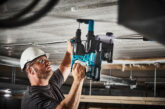
In uncertain times, it pays to know what’s coming over the horizon. Here, Lesley Rudd, CEO of leading UK charity, Electrical Safety First, considers the post-pandemic landscape – and its potential to expand opportunities for electrical contractors.
During the emergence from lockdown, its still unclear what the ‘new normal’ might be. But I hope one change arising from the pandemic remains: the recognised importance of groups of key workers as essential to our lives and economy.
As you know, electrical contractors comprise one of these groups. And, unlike some business sectors, they’re well-positioned to further increase their relevance in a post-pandemic landscape.
Here, I want to offer a few ideas around what I see as major opportunities for (what you might call) ‘the evolution of the electrician’.
Climate changes
Firstly, there is the critical issue of climate change and the need to reduce our carbon emissions. Lockdown has heightened public awareness of the problem with (for example), a visible improvement in air quality, caused by dramatically reduced travel and traffic. Decarbonising heat (reducing and eliminating the greenhouse gases it produces) is essential to tackling our climate emergency.
The UK’s Committee on Climate Change estimates at least 14% of our total carbon emission comes from the energy we use just to heat our homes – and recommended that new homes shouldn’t be connected to the gas grid from 2025.
Consequently, the Government’s Future Homes Standard will require all new homes, from 2025, to be future-proofed and provide low carbon heating. So electricity – now increasingly produced from renewable sources – is set to play a key role in new builds.
The need for retro-fitting low carbon heating in existing homes will be a greater challenge – but also a greater opportunity – as we transition from fossil fuels to renewables. Currently, the UK has around 27 million homes, with most (around 85%), heated by gas.
Electric avenues
Secondly, the climate emergency has also highlighted the Government focus on new low-carbon technologies, such as electric vehicles. Wherever possible, people prefer to have a dedicated EV home charging point installed, as it offers rapid charging and built-in safety features.
The demand for such charging points will increase, particularly as the emerging second-hand market in EVs matures. Revised infrastructure and planning measures will be needed to address this growth – and the installation issues for apartments and areas of high-density housing.
Such ideas, however, can’t be translated into a reality that is both safe and effective without appropriately qualified and competent electricians.
Home comforts
Thirdly, the shift to homeworking has been put on fast-forward by COVID-19. But while it offers some conveniences, it does create safety concerns. Around half of all UK domestic fires arise from electricity, with most caused by electrical products. Homeworking usually requires a number of such items, includng laptops, printers and mobiles.
At the beginning of lockdown we decided to do some research around this issue. We discovered that 40% of new homeworkers have more appliances plugged into extension leads than usual – often unaware that overloading sockets is a fire risk – and 44% of them are daisy-chaining the leads (an additional fire risk).
We used these research findings to develop a consumer awareness campaign around electrical safety while homeworking, and offered a range of online tools to help. We also stressed the importance of using registered electricians rather than attempting DIY electrical work.
Its true that many home workers don’t (currently) require particularly sophisticated technology to do their jobs. But the development of a home office may well encourage the mainstreaming of the smart home and whole-house integration of the internet of things (IOT) – another clear opportunity for the evolution of the ‘traditional’ electrician.
Growing up in the North East of England, there was an emphasis on getting a ‘proper job’ – i.e. one requiring training in a practical skill to gain a trade. Electrical apprentices were at the top of this trade ‘hierarchy’.
Other sought-after apprenticeships that were important during that time, such as shipbuilding and mining, have now disappeared. Electricians, however, have maintained their position as ‘key workers’, still critical to our lives and our society. In a post-COVID-19 world, there is the opportunity for this position to be strengthened further still.
Electrical Safety First is dedicated to reducing fires, deaths and injuries from electricity. Its product safety conference – A Sustainable Future – will be available free, online, in November.
Register for the conference by clicking here








